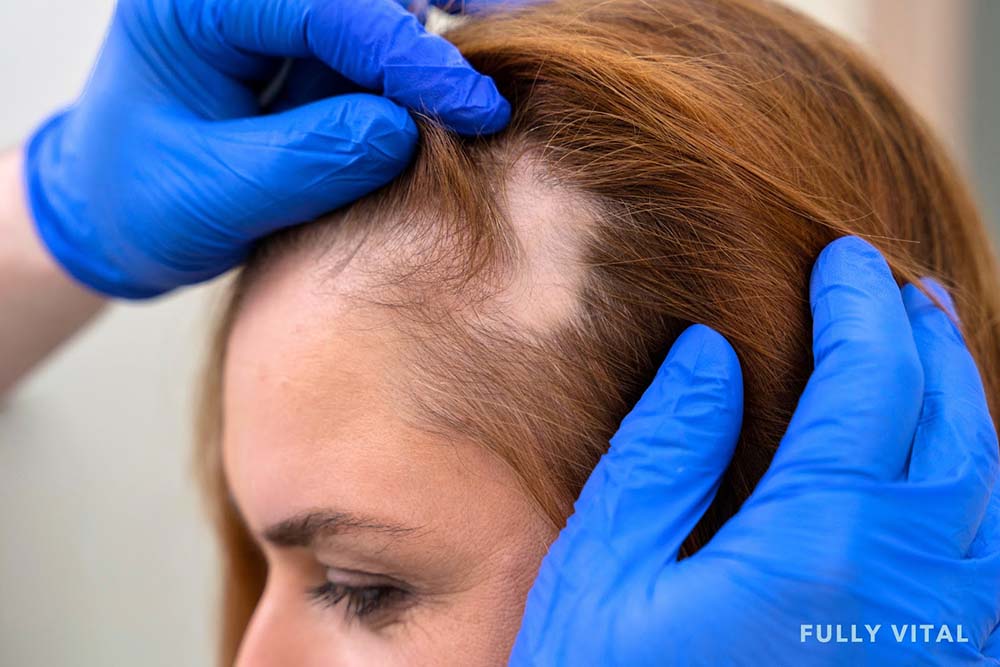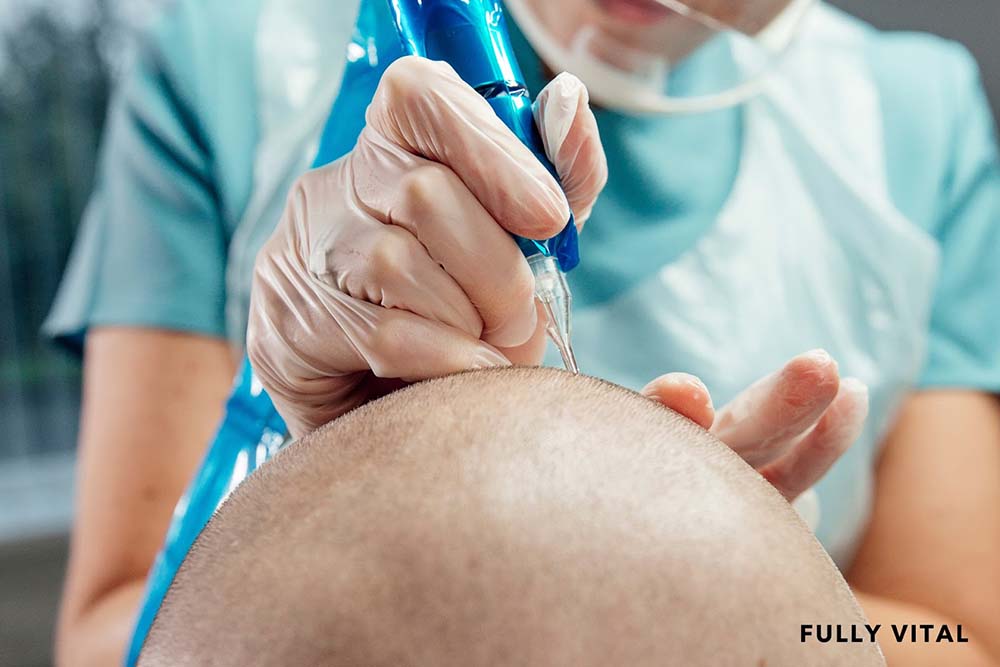
Lichen Planopilaris: Understanding and Addressing Hair Loss
Welcome to our blog page, where we aim to provide comprehensive information about various hair growth topics to help women of all hair types stimulate their hair growth.
In this article, we will dive into lichen planopilaris, a lesser-known condition that can affect hair health.
Let's explore what it is, how it works, its causes, potential downsides, and alternative solutions to manage it effectively.

I LOVE MY HAIR NOW
FullyVital hair serum and hair vitamins made tremendous improvements in my hair. I truly love my hair now.
Dorit S.,
What Is Lichen Planopilaris?
Lichen planopilaris (LPP) is a type of hair loss condition that falls under the broader category of lichen planus, an inflammatory skin condition.1
LPP specifically affects the scalp, leading to scarring and permanent hair loss if left untreated.
This condition can occur in individuals of all ages, but it's most commonly observed in adults.2

Why Is Lichen Planopilaris Awareness Important?
Raising awareness about lichen planopilaris is crucial because early detection and proper management can make a significant difference in preserving hair health.3
Many people may mistake the initial symptoms of LPP, such as itching and redness on the scalp, for other common issues like dandruff or eczema.
By understanding LPP, women can take timely action and seek appropriate treatment.
How Does Lichen Planopilaris Work?
Lichen planopilaris is an autoimmune condition, which means the body's immune system mistakenly attacks the hair follicles, leading to inflammation.
Over time, this inflammatory process causes the hair follicles to shrink and ultimately cease producing hair, resulting in permanent hair loss.
What Causes Lichen Planopilaris?
The exact cause of lichen planopilaris remains unclear, but researchers believe that genetics and immune system dysregulation play significant roles.
Some studies suggest that certain medications, viral infections, and stress could also trigger or exacerbate the condition in susceptible individuals.
Are There Any Downsides To Lichen Planopilaris?
While lichen planopilaris primarily affects hair health, it can also take an emotional toll on individuals experiencing hair loss.
The visible changes in appearance may lead to self-esteem issues and a decreased sense of confidence.
Therefore, addressing LPP proactively is not only essential for physical well-being but also for mental and emotional well-being.
What Are The Alternative Solutions To Lichen Planopilaris?
While lichen planopilaris has no known cure, several treatments aim to manage its symptoms and slow down hair loss progression.
Some alternative solutions include:
Topical Corticosteroids
Applying topical corticosteroids to the affected areas can help reduce inflammation and alleviate symptoms.
These medications can help control the autoimmune response and potentially slow down the hair loss process.
Oral Medications
In severe cases, dermatologists may prescribe oral medications, such as corticosteroids or immunosuppressants, to combat the underlying inflammatory response.
Topical Immunotherapy
Topical immunotherapy involves applying substances like diphencyprone (DPCP) or squaric acid dibutylester (SADBE) to stimulate an allergic reaction on the scalp.
This reaction redirects the immune system away from attacking the hair follicles.
Phototherapy
Phototherapy, or light therapy, utilizes specific wavelengths of light to suppress the immune response in the affected scalp areas.
Hair Transplantation
For individuals with significant hair loss due to LPP, hair transplantation may be an option to restore hair in the affected areas.
Who Gets Lichen Planopilaris?
Lichen planopilaris is a relatively rare condition that can affect individuals of all ages, but it is more commonly observed in adults between the ages of 30 and 60.
While it can occur in both men and women, research suggests that women may have a slightly higher risk of developing lichen planopilaris.
Genetic Predisposition
There is evidence to suggest that certain genetic factors may play a role in determining an individual's susceptibility to autoimmune conditions, including lichen planopilaris.
If you have a family history of autoimmune disorders, you may be at a higher risk of developing this condition.
Autoimmune Dysregulation
Lichen planopilaris is considered an autoimmune condition, meaning the body's immune system mistakenly attacks the hair follicles on the scalp.
This immune system dysfunction can lead to inflammation and scarring of the hair follicles, eventually causing hair loss.
Hormonal Influence
Hormonal fluctuations and imbalances may contribute to the development of lichen planopilaris.
Women going through menopause or experiencing other hormonal changes may be more susceptible to this condition.
Environmental Triggers
While not well understood, certain environmental factors or triggers, such as exposure to certain chemicals or allergens, may be associated with the onset or exacerbation of lichen planopilaris in some individuals.
What Are The Complications Of Lichen Planopilaris?
Lichen planopilaris can lead to various complications if left untreated or poorly managed. Some potential complications include:
Scarring Alopecia
Lichen planopilaris causes scarring alopecia, where the hair follicles are permanently damaged and replaced with scar tissue. This can result in irreversible hair loss in the affected areas.
Psychological Impact
Hair loss due to lichen planopilaris can have a significant emotional impact on individuals, leading to decreased self-esteem, anxiety, and depression.
Spreading of the Condition
In some cases, lichen planopilaris can spread to other areas of the scalp or even affect other hair-bearing areas of the body.
How Is Lichen Planopilaris Diagnosed?
Diagnosing lichen planopilaris requires a thorough evaluation by a qualified dermatologist.
The diagnosis is typically made based on a combination of the following:
-
Physical Examination The dermatologist will examine the scalp for specific signs of lichen planopilaris, such as redness, scaling, and hair loss patterns.
-
Medical History Providing information about any existing medical conditions, family history of autoimmune disorders, and current medications can help with the diagnosis.
-
Scalp Biopsy A small sample of the affected scalp may be taken for a biopsy to confirm the presence of lichen planopilaris and rule out other conditions.
Is Lichen Planopilaris Cancerous?
No, lichen planopilaris is not cancerous.
It is an inflammatory skin condition that falls under the broader category of lichen planus, an autoimmune disorder.
While the term "lichen" may sound concerning, it does not indicate cancer in any way.
Understanding the Terminology
The term "lichen" in lichen planopilaris refers to the characteristic appearance of the affected skin, which may resemble lichen plants found in nature.
However, it is essential to understand that this is purely descriptive and has no connection to cancerous growths.
Differentiating from Cancerous Conditions
Cancerous conditions, such as various forms of skin cancer, involve the uncontrolled growth of abnormal cells that can invade nearby tissues and spread to other parts of the body.
Lichen planopilaris, on the other hand, is an autoimmune condition where the body's immune system mistakenly attacks the hair follicles on the scalp.
Unlock the Secrets of Timeless Hair with Fully Vital Hair Growth Solutions!At Fully Vital, we believe in the power of science-backed hair growth products to help you take control of your hair's aging process. Our carefully crafted solutions are designed to slow down and even reverse the effects of hair aging, so you can cherish a more healthy and vibrant relationship with your locks. Discover the Benefits:
At Fully Vital, we're committed to supporting you on your hair health journey. Say goodbye to concerns about hair aging and unlock the secrets of timeless hair. Embrace the beauty of healthy hair growth with Fully Vital Hair Growth Solutions today! |
Final Thoughts On Lichen Planopilaris
Lichen planopilaris is a condition that can significantly impact hair health and overall well-being.
Early detection and proper management are vital in preserving hair follicles and mitigating the effects of scarring alopecia.
Remember, if you experience any symptoms like itching, redness, or patchy hair loss on your scalp, seeking prompt medical attention from a qualified dermatologist is essential.
At Fully Vital, we understand the importance of a healthy relationship with your hair.
Our hair growth products are designed to address hair aging concerns, promoting natural, vibrant, and resilient locks.
We believe in empowering women of all hair types to embrace healthy hair growth and feel confident in their journey to maintain beautiful hair.
Explore our range of hair growth solutions to support your hair health journey and find the right products that align with your needs.
Take control of your hair's vitality and unlock its full potential for a more confident and vibrant you.
Remember, your hair journey is unique, and seeking professional advice from a dermatologist can guide you toward the best approach for managing lichen planopilaris and nurturing your locks.
Let us join you on your path to fully embracing your hair's vitality and celebrating the beauty of healthy hair growth.
Together, we can achieve hair that stands the test of time and brings joy every step of the way.
Frequently Asked Questions About Lichen Planopilaris
Can lichen planopilaris be cured completely?
As of now, there is no known cure for lichen planopilaris.
However, early detection and appropriate management can help control its symptoms and slow down hair loss.
Does lichen planopilaris only affect the scalp?
While lichen planopilaris primarily affects the scalp, it can also occur on other hair-bearing areas of the body.
Is lichen planopilaris contagious?
No, lichen planopilaris is not contagious. It is an autoimmune condition and cannot spread from person to person.
Are there any lifestyle changes that can help manage lichen planopilaris?
While lifestyle changes cannot cure lichen planopilaris, managing stress and maintaining a healthy lifestyle may contribute to overall well-being.
Can hair regrow on areas affected by lichen planopilaris?
In some cases, hair regrowth is possible with proper treatment. However, if the hair follicles have been extensively damaged, regrowth may not be feasible.
How Do I Know if I Have Lichen Planopilaris?
Diagnosing lichen planopilaris requires a professional evaluation by a qualified dermatologist.
However, there are some signs and symptoms to watch out for:
-
Itching and Scalp Discomfort Lichen planopilaris often begins with itching and discomfort on the scalp, which can progress to burning sensations.
-
Red or Violaceous Lesions Look for red or purple flat-topped papules on the scalp, which may have a shiny appearance.
-
Patchy Hair Loss Lichen planopilaris can cause patchy areas of hair loss with a characteristic "moth-eaten" appearance.
If you notice any of these symptoms, it is essential to consult a dermatologist promptly for a proper diagnosis and personalized treatment plan.
What Foods Should Be Avoided with Lichen Planopilaris?
While specific foods have not been directly linked to causing lichen planopilaris, certain dietary considerations can contribute to overall well-being and support the treatment process:
-
Limit Processed Foods Reduce your intake of processed foods, sugary snacks, and beverages to support a balanced diet.
-
Increase Antioxidant-rich Foods Incorporate fruits, vegetables, nuts, and seeds into your diet, as they are rich in antioxidants and can promote a healthy immune system.
-
Avoid Potential Allergens If you suspect any food allergies, consider eliminating or reducing those foods from your diet.
Remember, while diet can play a role in overall health, it is not a substitute for medical treatment.
Always consult a healthcare professional for personalized dietary advice.
Is Lichen Planopilaris Life-Threatening?
Lichen planopilaris itself is not life-threatening. However, if left untreated or poorly managed, it can lead to complications such as scarring alopecia and significant hair loss.
Additionally, the emotional impact of hair loss can affect an individual's well-being. Seeking timely medical attention and following a treatment plan can help manage the condition effectively.
What Happens if Lichen Planopilaris Goes Untreated?
If lichen planopilaris goes untreated, it can lead to progressive hair loss and permanent scarring on the scalp.
The condition can become more challenging to manage as it progresses, and reversing the damage becomes more difficult. Early detection and intervention are crucial to minimize the impact of lichen planopilaris on hair health.
What Are The Other Types Of Scarring Alopecia?
The other types of scarring alopecia include frontal fibrosing alopecia, lichen planopilaris, and lupus erythematosus.
Sources:
-
Lichen Planopilaris: Hair Loss, Symptoms & Treatment. (n.d.). Cleveland Clinic. Retrieved August 1, 2023, from https://my.clevelandclinic.org/health/diseases/24537-lichen-planopilaris#:~:text=Lichen%20planopilaris%20(LPP)%20is%20a
-
Lichen Planopilaris: Hair Loss, Symptoms & Treatment. (n.d.). Cleveland Clinic. https://my.clevelandclinic.org/health/diseases/24537-lichen-planopilaris
-
Lepe, K., Nassereddin, A., & Salazar, F. J. (2021). Lichen Planopilaris. PubMed; StatPearls Publishing. https://www.ncbi.nlm.nih.gov/books/NBK470325/






